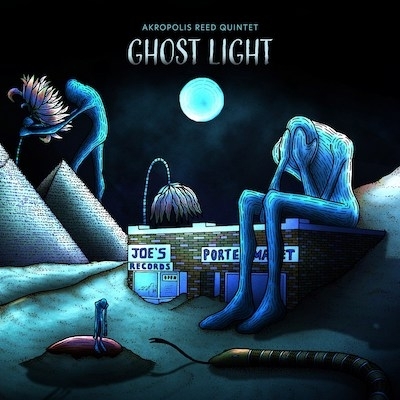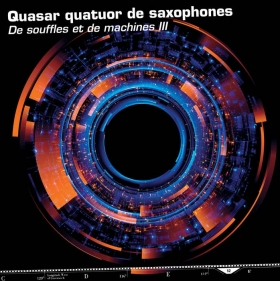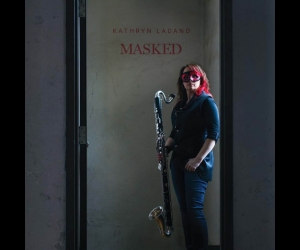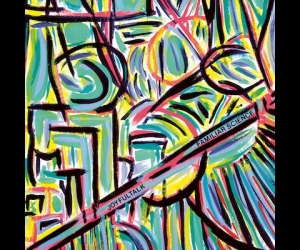The year 2021 delivered eclectic offerings of literal and abstract artistic storytelling in U.S.-based Akropolis Reed Quintet’s most recent album Ghost Light, and the latest iteration of De souffles et de machines by Canadian new-music veterans Quasar.
The strength of Akropolis Reed Quintet’s latest album Ghost Light is the vast spectrum and variety of the works. The music offers theatricality, poetry, and creative layering of the five distinct woodwind voices.
Niloufar Nourbakhsh’s Firing Squad is a highlight. Just over seven minutes long, it is a microcosm of intense expressions of sorrow, reflection, and hope, a work that feels relevant to a world that is constantly shifting between extremes. The piece draws on the opening line of Gabriel García Márquez’s novel One Hundred Years of Solitude, in which Colonel Buendía faces a firing squad and reflects on his memories of his father. But we later discover that he is not killed by the firing squad; we have been tricked by a circular way of connecting past and present. In Firing Squad, Nourbakhsh’s use of electronics beautifully complements the way the quintet blends in and out of the rhythmic electronic drone, relaying ideas of memory by referring to material heard earlier in the piece. Mournful cries are expressed by the slow bends and glissandos passed around between the high woodwinds. These shifts in mood build an intensity that allows us to accept the catharsis of the final release.
The other highlight of this album is Homage to Paradise Valley. Marsha Music’s poetry is juxtaposed with Jeff Scott’s music, which paints images of Detroit and the ghosts haunting the histories of the living. The text is a gorgeous poetic documentation of several of Detroit’s centres of Black history, culture, and community. Scott’s music complements Music’s text without overwhelming it, as the two elements go back and forth in the last portion of the album.
The Montreal-based saxophone quartet Quasar presents the third iteration in their wind and machine series, De souffles et de machines III. The album opens with past collaborator Jimmie LeBlanc’s De sphères et d’écumes, a rewarding bubbling of texture and gradual build over the course of twenty minutes; it combines the ethereal microtonality of both the saxophone and the electronic components. LeBlanc’s work plays with exactitude of rhythm and tuning with purposeful disarray and gentle sonic chaos. Immersed in LeBlanc’s soundworld, the listener is finally offered a gentle release and aural cleanse as the sound of water takes over the last few minutes of the work.
Georgia Spiropoulos’s Interjections is a welcome pause from the denser and louder works in the collection. Spiropoulos’s palette consists of saxophone key-clicks and spider-like, crawling electronic sounds—the first time I’ve ever felt goosebumps while listening to a piece.
Leaning into theatricality and persuasion, Annesley Black’s Not Thinking About the Elephants plays musically with the psychological concept of intrusive thought. This is a multidimensional piece that goes beyond traditional through-composed music by using difference tones, theatrical elements, and live electronics. What makes it fun to listen to is the way it forces the audience member to engage with the nonexistent yet existing parameters of not thinking about elephants and all the musical forms that idea can take.
The last few minutes of Construct-Deconstruct is a literal EDM party, showing the influence of the German club scene and the connection with contemporaneity in Sergej Maingardt’s work. This piece shifts frequently over a long period of time—well worth it for the wild journey it takes the listener on, from contemporary classical to rave in a forest.
Each of the four works are in distinct metaphorical galaxies. This album is a delightful reassurance of Quasar’s never-ending quest to offer a distinct variety of artistic storytelling. In their collaborations, the quartet has taken adventurous and beautiful risks that have paid off to the listener’s benefit.




